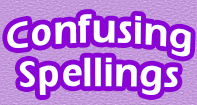- HOME
- GAMES
- WORD GAMES
- CONFUSING SPELLINGS
×
Change Avatar
Confusing Spellings
console:
Confusing Spellings
Confusing spellings can present challenges for students. Here are some strategies to help students navigate and overcome confusing spellings:
- Visualize Words: Encourage students to visualize words and their spellings. Encourage them to create mental images or associations that help them remember the correct spellings. For example, for the word "receive," they can imagine a person with an "i" in their eye receiving a package.
- Word Chunks and Patterns: Teach students to recognize common letter patterns or chunks in words that may cause confusion. Help them identify patterns like "ei" and "ie," "ou" and "ow," or "c" and "k" sounds. Practice spelling words with these patterns and discuss the rules or guidelines that govern their usage.
- Word Sorts: Engage students in word sorting activities. Provide a list of words with similar spelling patterns but different sounds or meanings. Ask students to categorize the words based on their patterns and discuss the differences. This helps build awareness of spelling patterns and strengthens recognition skills.
- Mnemonics and Memory Techniques: Introduce mnemonic devices or memory techniques to help students remember challenging spellings. For example, using the sentence "Big Elephants Can Always Understand Small Elephants" to remember the spelling of "because." Encourage students to create their own mnemonic devices based on their individual learning styles.
- Word Analysis and Breaking Words Down: Teach students to break words down into smaller units, such as syllables or morphemes. Help them identify prefixes, suffixes, and root words to understand the structure and spelling of complex words. This approach can help students decipher the correct spellings.
- Contextual Reading and Writing: Encourage students to engage in extensive reading and writing activities. Exposure to a variety of texts helps students encounter words in context, which enhances their understanding of spelling and usage. Writing regularly provides opportunities for practicing and reinforcing correct spellings.
- Word Puzzles and Games: Use word puzzles, crossword puzzles, word jumbles, or spelling games to make spelling practice enjoyable and engaging. These activities challenge students to think critically and apply spelling rules while having fun.
- Personal Spelling Lists: Create personalized spelling lists for students based on their individual needs. Focus on words that they find particularly challenging or commonly misspell. Encourage students to practice these words using strategies such as writing them multiple times, creating sentences, or visualizing them.
- Peer Support and Collaboration: Encourage students to work in pairs or small groups to support each other in spelling practice. Students can quiz each other, play spelling games together, or engage in collaborative spelling activities. Peer support fosters a positive learning environment and provides opportunities for learning from peers.
- Continuous Review and Reinforcement: Consistently review and reinforce spelling rules and patterns throughout the year. Regularly revisit previously learned words and spelling concepts to ensure retention and mastery. Encourage students to continually practice and apply their spelling skills in various contexts.
By implementing these strategies and providing ongoing support and practice, students can develop strategies to tackle confusing spellings and become more confident and accurate spellers.




